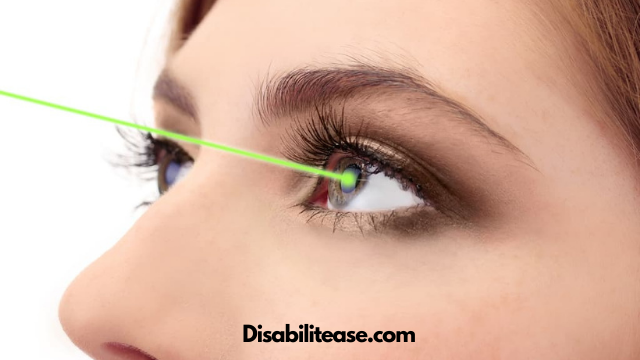Can lasers blind you? Yes, lasers can blind you. But there is nothing to worry about if you are not going to look at the laser for a long period of time. In case you will look at it then the odds can be against you.

Lasers or not something to play around with. You will see them in everyday activities such as scanning machines, DJ shows, printing press, and even on your personal computers.
Here is a related article that might interest you on Can A Blind Person Own A Gun?
Human exposure to lasers is increasing by the day. And the damages that lasers are causing are manifold. Our eyes are vulnerable to high exposure to light.
Let’s find out the kind of damage laser beams can cause to our eyes.
Table of Contents
What Happens When A Laser Hits Our Eyes? Can Lasers Blind You?
If a laser beam is closely pointed to a person’s eye, the light will first pass through the pupil. This light is already concentrated and is then further focused by the lens on a precise area on the retina. This can penetrate the retinal layers causing scars or a burn in the eye.
The more time the light will stay in the person’s eye, the more injury it will cause. The person’s central vision can be entirely lost, becoming permanently blind. Therefore, it is highly recommended to avoid exposure to high light beams, especially laser pointers.
How Can Lasers Affect Your Eyes?
Lasers can cause a damaging effect on your eye in the following ways:
- If the laser hits your retina, you might experience a bright light flash when the retina is exposed to 2mW brightness for a short time. This can cause an eye impairment that may turn into chronic eye loss.
- Any bright light that the eye sees for at least a quarter or more than a second can potentially damage the eye. Naturally, the eye starts to blink after every 0.2 seconds. This is a natural defense mechanism adopted by our body to protect the eyes. However, if a laser beam is 1mW or more, it can easily hurt your eyes permanently.
- Sometimes it is just a flash of blindness. This means that you only get blind temporarily due to light flashing or the high intensity of a beam that can cause damage to the retina.
- Lasers that range from 5 mW to 500 mW can damage your eyesight permanently; they can even burn your eyes.
- Colored lasers can also be hazardous for your eyes. If we look at the research then we can safely say that the laser which is green in colour may be more terrible than red.
- The person affected by laser beams can have double vision, distorted images, floaters, and might see flashing lights.
- Sometimes a flash from the camera or sudden exposure to a light channel can temporarily affect the person’s eye. This is not quite dangerous, yet it still depends on the situation. If a person is driving a car or flying an airplane, this can be their worst nightmare.
- You should remember that the wavelength of the light holds an importance and which tissue is going to be exposed also plays an important role.
- The part of the eye which is most susceptible to being damaged by laser is the cornea or pupil. They are one of the most sensitive eye parts as they focus and capture images.
Things to Avoid:
Make sure you follow these rules by heart if you see yourself getting around lasers.
- Lasers should be kept out of the reach of children. Never buy laser pointers for them.
- Never aim or point out the laser directly into someone’s eyes. This can cause a severe accident.
- At times children throw laser beams into animal eyes. This can cause them a lot of damage because the light’s wavelength can cause chronic eye impairment.
- Never point the laser beam at the moving vehicle, especially cars and buses. The driver can get startled and can experience temporary blindness. This can cause serious accidents.
- Never buy a laser that has the capacity to meet more than 5mw of power.
- Always read the label printed on the back of toy guns, laser beams, etc., and see their wavelength written on it. Try getting a class one laser product with a lower emission level.
- Try to wear eye protection gear so that the laser doesn’t go directly into the eye.
- The opthamologist or optometrist is the one to see if the laser managed to hurt your eye.
Conclusion
Lasers can be dangerous so make sure that you are not playing around with them consciously. Caution is necessary when you are around lasers.

Hi, my name is Eddie, I am a professional trainer specializing in the elderly population and I’m also a website designer. I love training in the gym, going to the beach, traveling, and having good food.
I combined my love for sport and website designing to make “DisabilitEase” whose purpose is to help elderly and disabled people live a more full and active life, have more fun, and enjoy their unique journey despite any disability.



